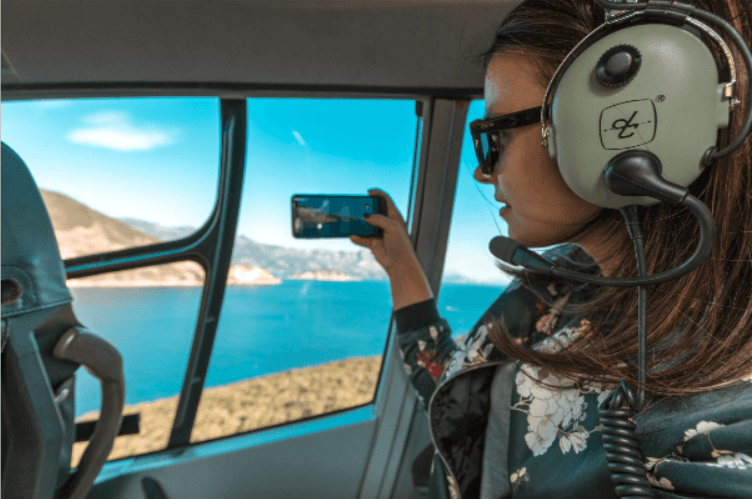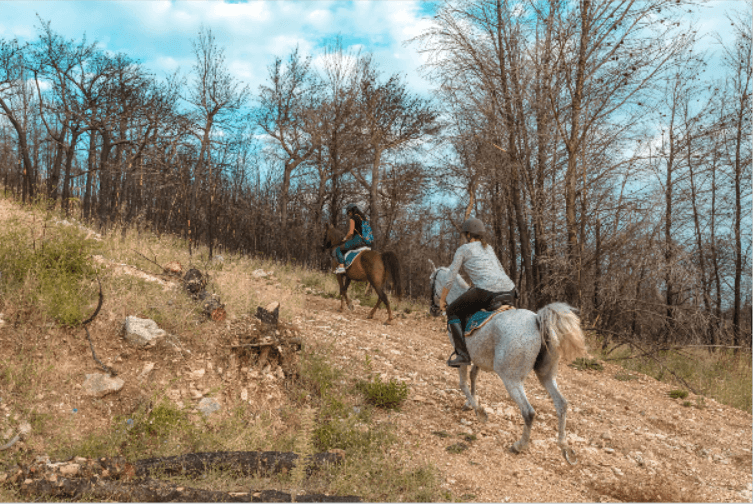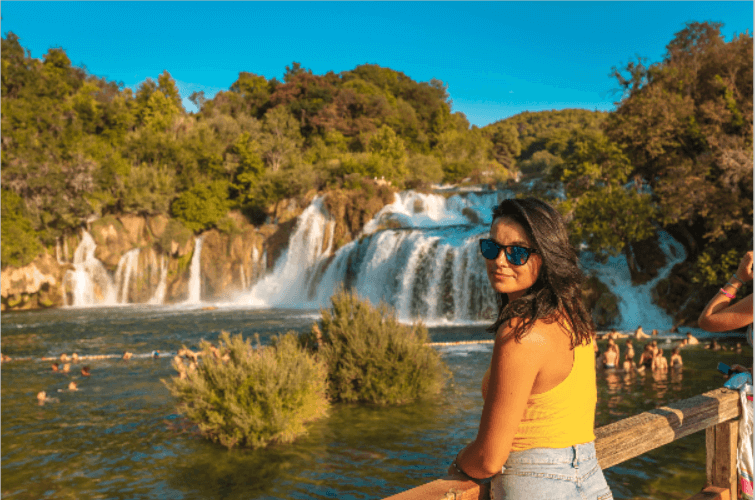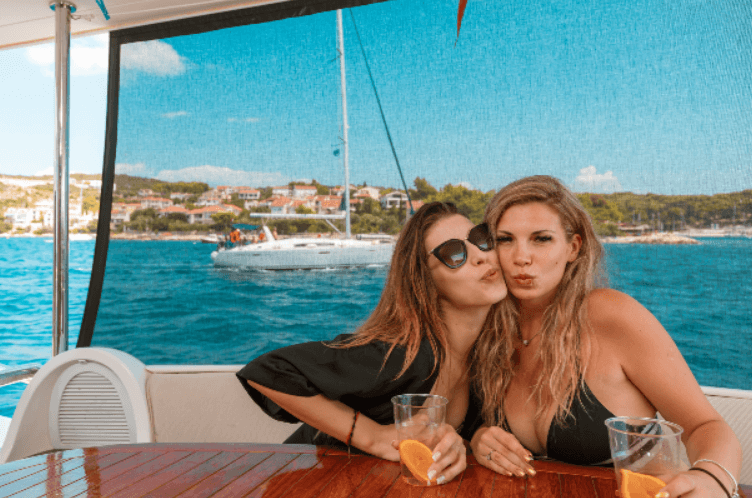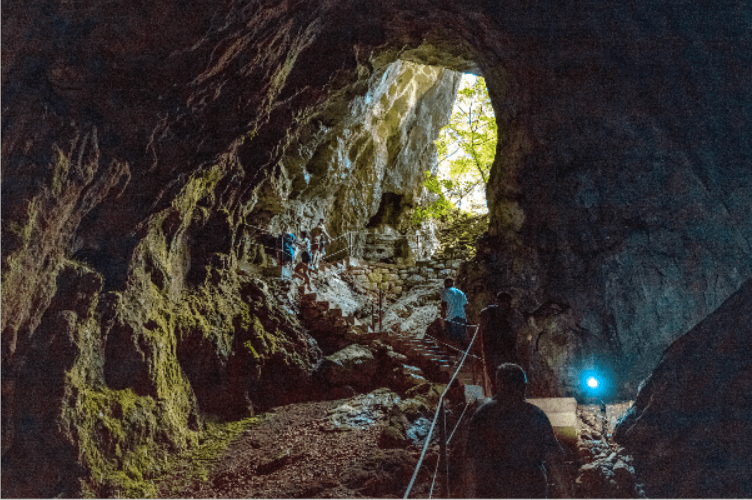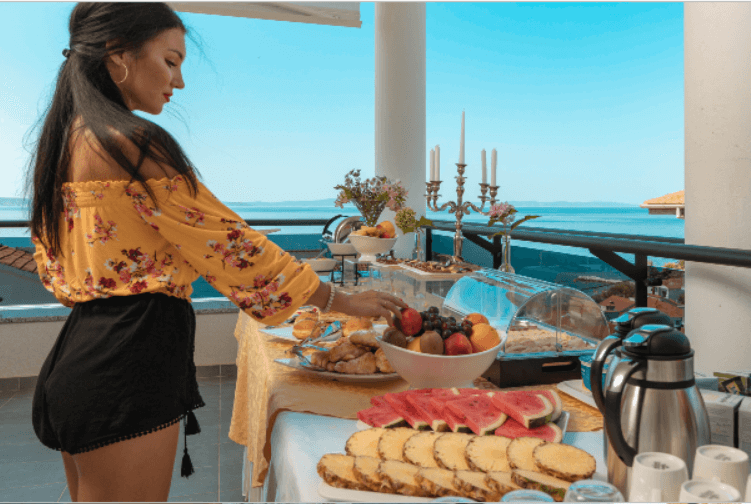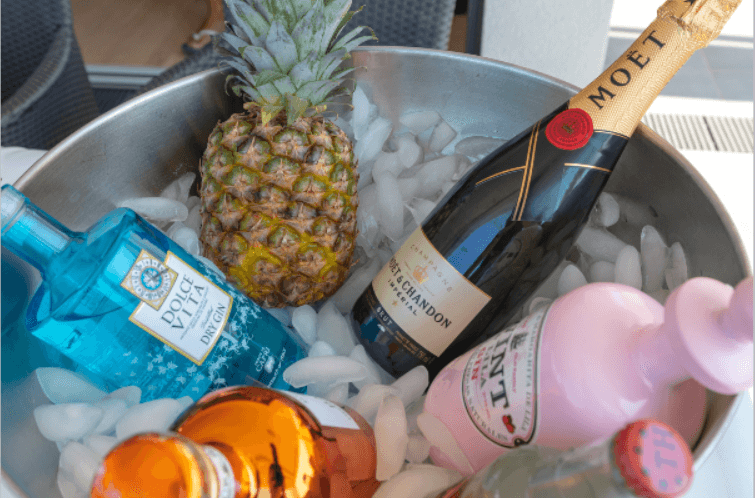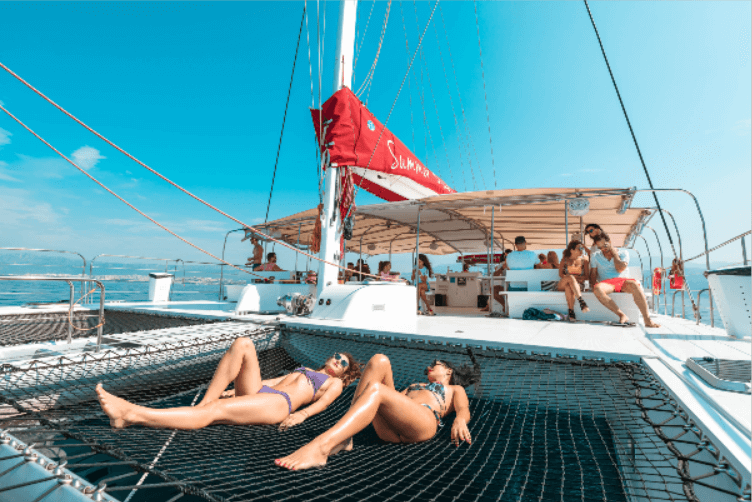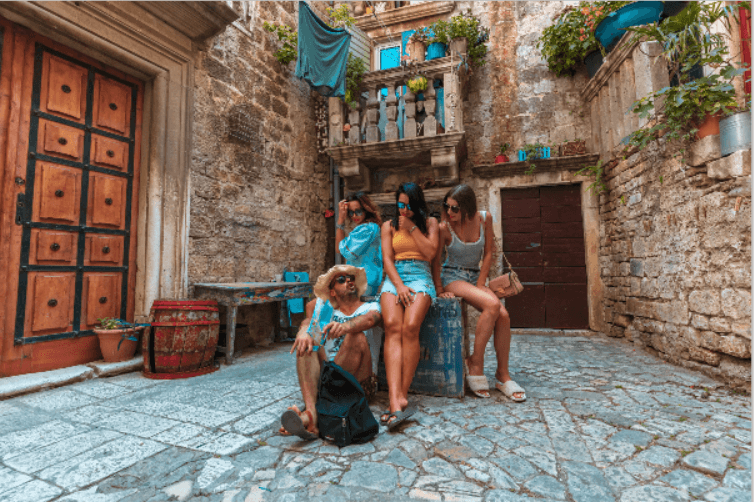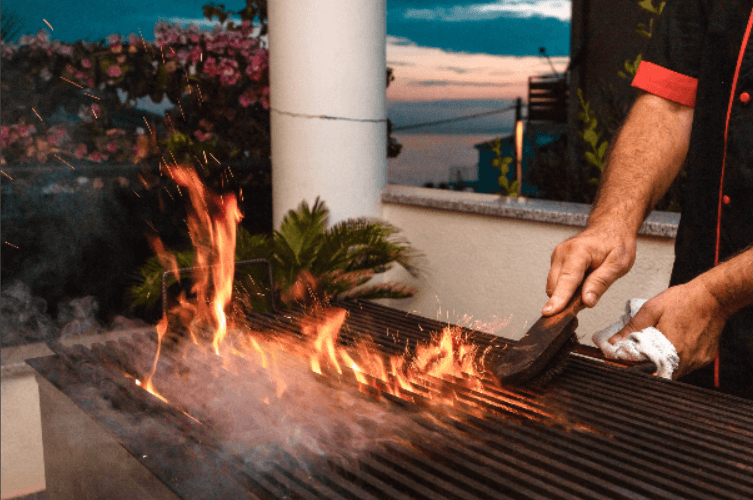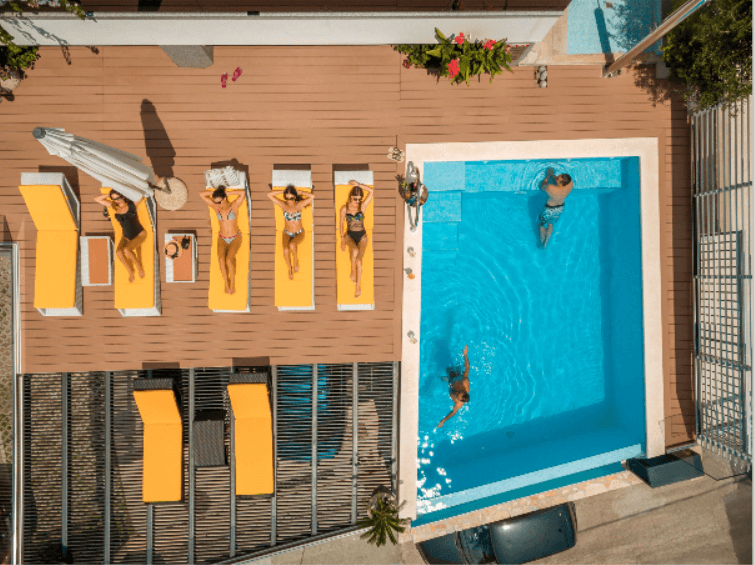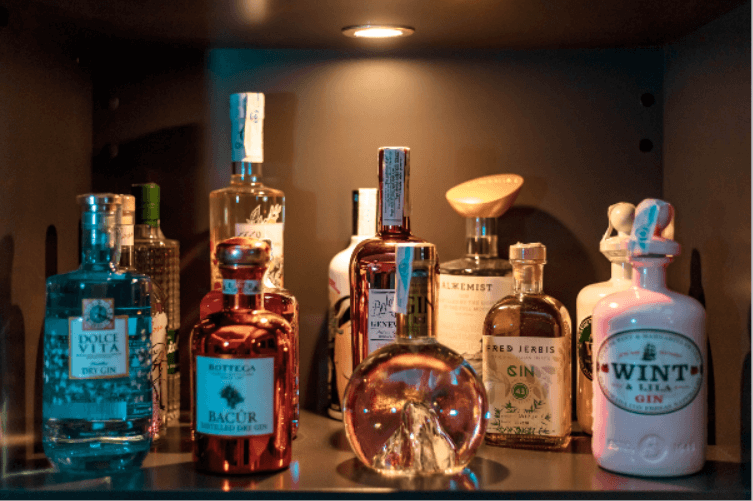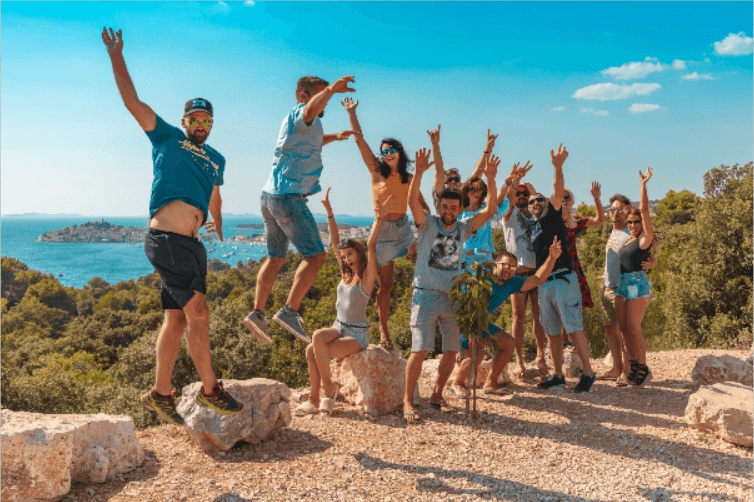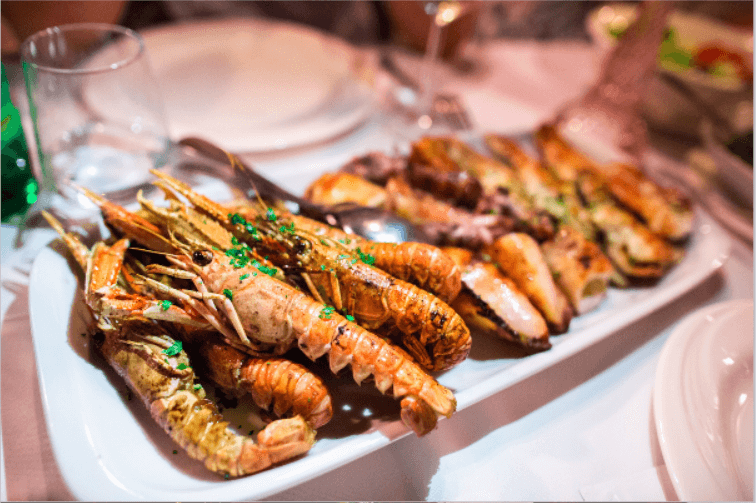Three NATO Ships Sailing to Split on Tuesday
Three NATO ships will sail to Split's waterfront on Tuesday and visit the Croatian Navy on May 18th, the Ministry of Defense announced on Monday, reports Slobodna Dalmacija on May 13, 2019.
MORH announced that it is a group of SNMG2 (Standing NATO Maritime Group 2), and their mission is to strengthen interoperability between the Croatian Navy and NATO.
Command ship SNMG2, Dutch frigate HNLMS EVERTSEN, along with the Canadian frigate HMCS TORONTO will travel to Split's Lora harbor, located in the northwestern part of Split, early Tuesday.
The third ship from that group, the destroyer of the British Royal Navy HMS DUNCAN (D-37), will sail into the Split city port. Recall, Prince Edward, Earl of Wessex, will visit Split on May 16 and 17. On the British Royal Navy destroyer HMS DUNCAN, which will be docked at the Split port, the Royal Highness will be joined by representatives of the Government of the Republic of Croatia and the Armed Forces to mark close cooperation between the United Kingdom and the Republic of Croatia in the areas of defense and security - both bilaterally and within NATO - as well as the 10th anniversary of Croatia's membership in NATO.
During the visit to Croatia, the delegation of the SNMG2 will attend a working visit to the command of the HRM and the Split City Government.
The permanent group of NATO boats (SNMG and SNMCMG) integrates multi-national naval forces in which the ships of the member states of the Alliance are included. The groups provide constant support to NATO in carrying out operations, military exercises and diplomatic activities. The SNMG2 group consists of nine vessels permanently engaged in the Mediterranean area. Commander of the group is Commodore Boudewijn Boots.
To read more news in Croatia, follow TCN’s dedicated page.
Mediterranean Book Festival in Split Welcomed 40% More Visitors than 2018
The Mediterranean Festival of Books in Split, the largest Dalmatian festival of books, was completed on Sunday evening. This year’s edition saw a forty percent increase in visitors at Split's Gripe arena compared to the previous year, and its reanimation and organization of engaging panel discussions, which brought famous names of the Croatian literary scene, proved to be more than successful, reports Dalmacija Danas on May 13, 2019.
“Special significance was given to the creation of future readers thanks to a children's program designed to foster imagination and the love for reading. It has been shown that Split has the potential to make this cultural step sustainable,” said organizer Mišo Nejašmić.
“We believe that the forthcoming festival releases will be at an even higher level. This year's program was exceptionally attended and met all expectations. The last day of the fair, many visitors were sad that the festival must end.
This edition of the festival was really colorful. Along with the quality literature, thanks to sponsors, Black'n'Easy coffee, radlers and beers from Laško brewery, CedeviteGo and Kala water were distributed all day. Meeting acquaintances, new friends and socializing with books is what adds value to the Mediterranean Festival of Books.”
The organizers of the festival were particularly pleased with the number of visitors, who came via catamarans from the islands and on buses from Makarska, Šibenik, Sinj, Herzegovina,and Montenegro. And no one left the festival empty-handed - thanks to a varied offer, visitors could enjoy everything from Alan Ford hardcovers for 10 kuna to “Anima Delmatice” which dropped from 750 to 199 kuna.
“Even panel discussions with topics that were not for the wider audience, such as those on architecture or libraries, were exceptionally attended - and the organizers even made sure to include gastronomy and stand up comedy in the whole story. When the mayor of Split arrives in civilian clothes the day after the opening, then you know that you have done a good thing,” said Slavko Kozina, the head of the Association of Publishers and Bookstores of the Croatian Chamber of Commerce.
In addition to Andro Krstulović Opara, the festival also welcomed many other famous names, including Dalija Orešković, Ivano Balić, Tisja Kljaković Braić, Viktor Ivančić, representatives of local and county authorities, Ivan Pažanin, Matko Marušić, Ivica Ivanišević, Jurica Pavičić, Marko Tomaš, Tanja Mravak, Emir Imamović Pirke, Damir Karakaš, Pavao Pavličić, Nebojša Lujanović, and Julijana Matanović.
The Mediterranean Festival of Books, organized by the Association of Publishers and Bookstores of the Croatian Chamber of Commerce (HGK) and under the auspices of the Ministry of Culture, Split-Dalmatia County and the City of Split, was held from the 8th to the 12th of May, 2019.
A record 100 exhibitors offered discounted books of up to seventy percent off, with around 10,000 titles to choose from.
The entrance to the festival was free, and visitors could see the latest publications covering a space of more than two thousand square meters in the large hall of ŠC (Arena) Gripe.
Fifty program activities were prepared, with as many as 35 promotions of the latest works of some award-winning and acclaimed authors taking place.
The panels consisted of prominent lecturers who spoke about important local topics, as well as a multitude of workshops for the youngest among the festival's visitors on offer.
The Mediterranean Book Festival was organized with the support of numerous partners such as the Split Tourist Board, Split University, Split Student Centre, the Split Sports Facilities public institution, Hotel Zagreb - Split, Cukarin Gripe, Slobodna Dalmacija, Europlakat, Mandis, CineStar, Barcaffè, CedevitaGo, and Kala.
To read more about lifestyle in Croatia, follow TCN's dedicated page.
Successful Diaspora Returnee Stories: Korana Bucic, Zinfandel, Split
The 2nd International Conference on Diaspora Tourism opens in Split on May 17, 2019. In the build-up to the conference, TCN meets some of the returning diaspora who have made a success of life in Croatia. Next up, Korana Bucic.
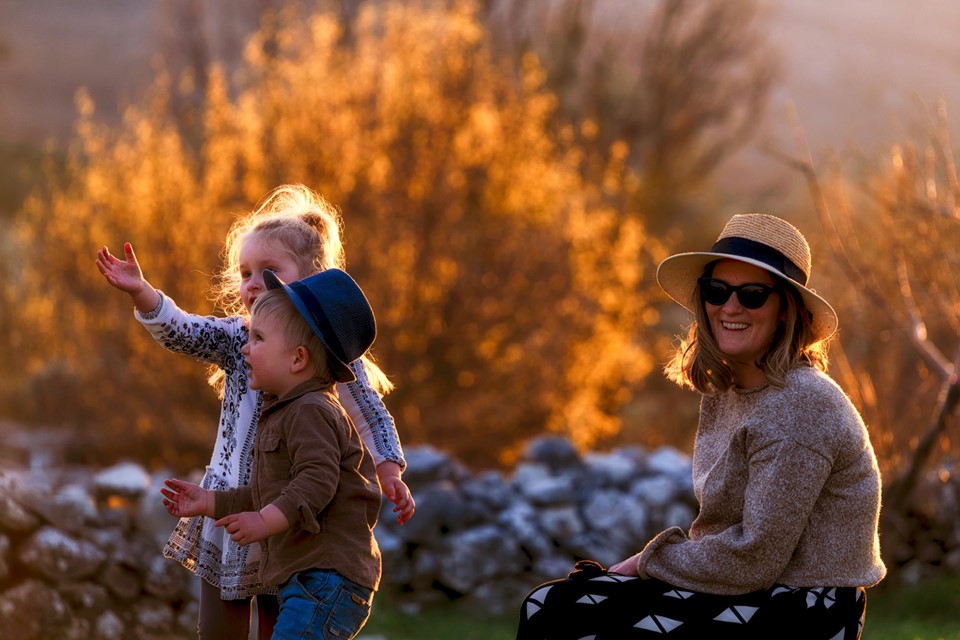
Born in Australia, returned to Croatia, something that many diaspora dream of doing. Tell us briefly about your journey.
It’s been a wild ride, to say the least. Maria and I moved here in 2006 and opened up Booze and Snooze Hostel, which was the first registered hostel in Split. Over the years, we have expanded the company by opening two additional hostels, Fiesta Siesta and Hvar Out (in partnership) as well as Charlie's Backpacker's Bar, Zinfandel Food and Wine Bar and Brasserie on 7.
I actually wish I had kept a journal of our journey, as believe it or not, I have forgotten so many of the hurdles and struggles that we faced over the years. The beginning was definitely the hardest. Initially, dealing with bureaucracy and getting permits and licenses was the most difficult, but over the years it has become easier. The systems have definitely improved a lot over the years. Over time, we have accepted the way things are and don't get all worked up about it anymore ... it’s become our new normal.
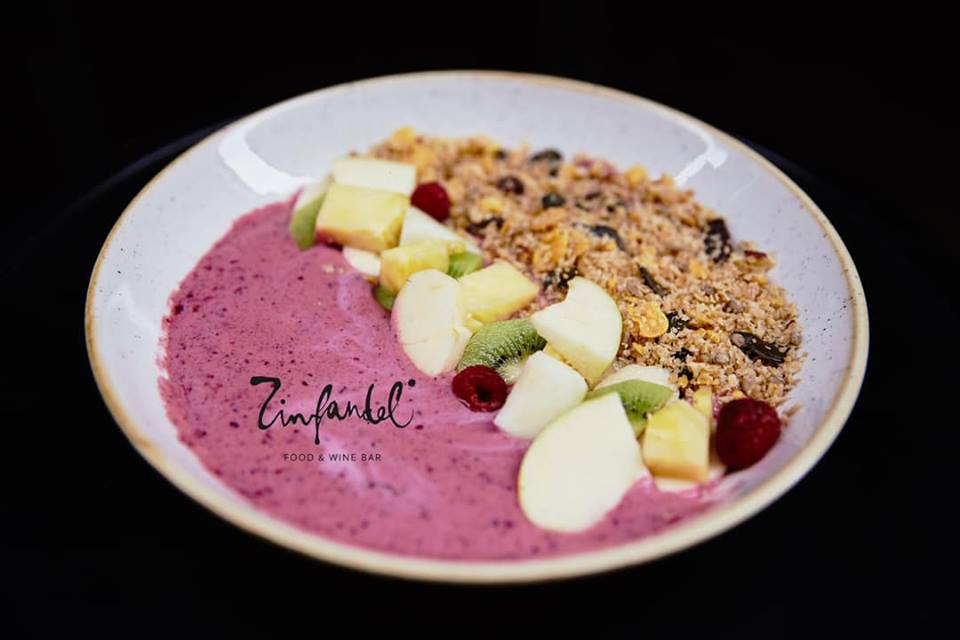
Looking back, what were your hopes, expectations and fears about moving to Croatia?
Looking back, I don't think I really had that many expectations. The information back then was extremely limited or non-existent, especially when it came to opening a hostel. We had to physically come to find out anything. I didn't play out all the ‘what-ifs’ in my head; I more so thought, “What's the worst that could happen?” Worst-case scenario we could be back home (Sydney) within two days.
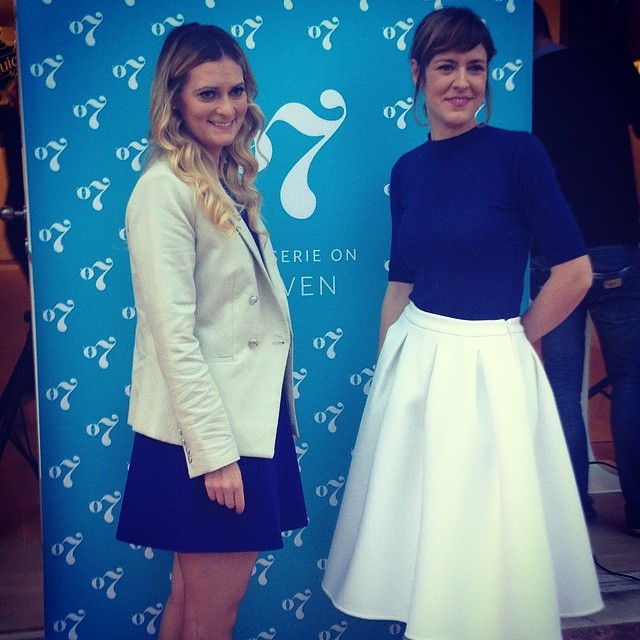
Don't get me wrong, we definitely came with a plan to open a hostel; we had worked on a business plan for about a year. I remember before we even arrived, we had the logo and flyers printed, and all we needed was a building. We were young, positive, extremely determined and thankfully a little naïve, which in hindsight, was a blessing. I remember my favourite quote at the time: "I would rather try and fail than not try at all". I knew if I didn't try that it would be something that I would always regret.
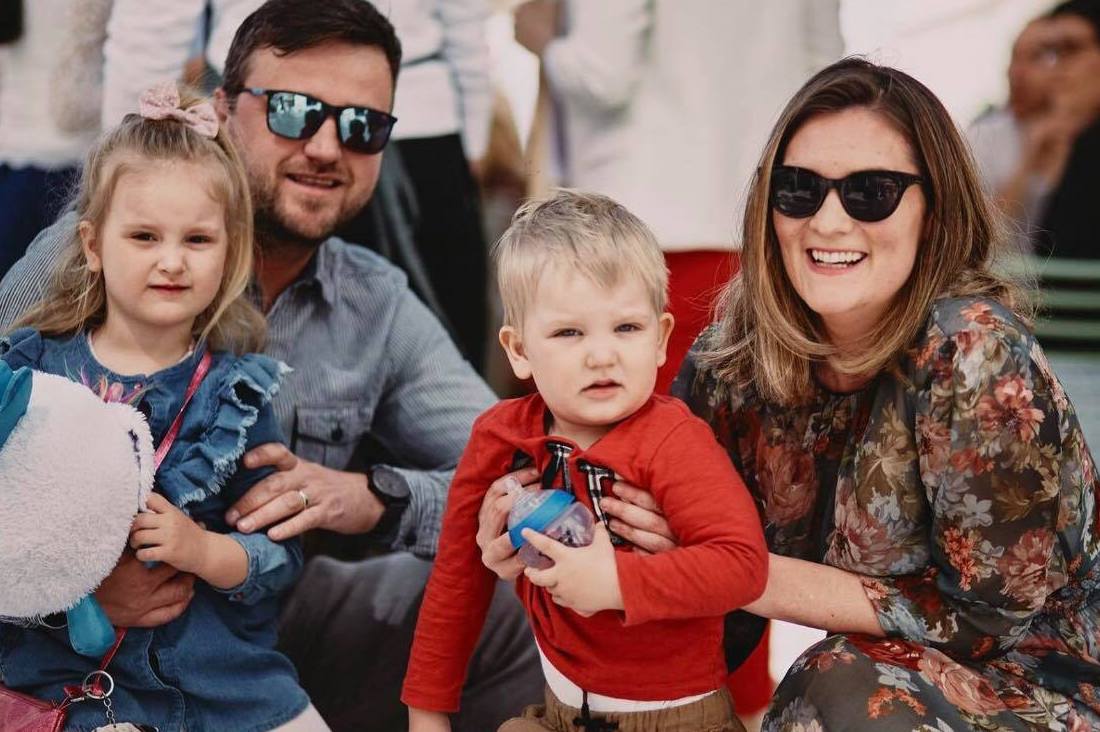
How supportive was your Croatian community back home at the time?
My parents were always extremely supportive of both of us and all our visions. They always trusted our judgment and were there to support our mistakes. The thing they believed in the most was definitely mine and Maria's friendship and bond (childhood friends). I think for them knowing that we were doing this together gave them a lot of comfort. A few members of the older generation did comment that they thought we are making a mistake as a lot of them had bad experiences with business in Croatia. Regarding the diaspora community, in general, they have always been a huge support network for us from the very beginning and still continue to be which has always meant so much.
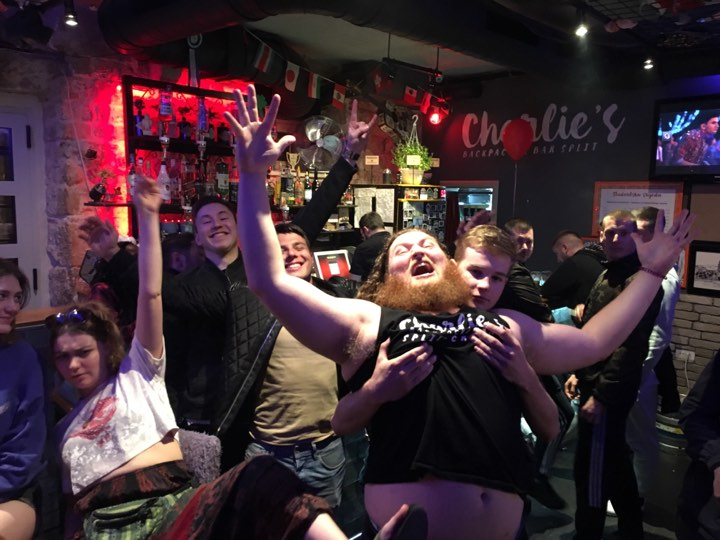
What were the main differences in what you expected to find in Croatia and the reality of living in Croatia?
When we first moved here, we wanted to make a hostel shirt with the slogan "My life is your holiday," as people often think we are living the dream but it's not quite like that; in reality, in many ways, it feels like another world and even sometimes another era. So many things functioned differently than how we were was used to. One of the first things that come to mind, which I noticed on a daily basis, was the difference in customer service. We came from a land that teaches you the customer is always right. Being unprofessional or rude in the workplace would leave you jobless pretty quickly. That was definitely not the case here.
Often, as the customer, I would feel the frustration of the employer and hear about all the internal problems they are having, especially when dealing with the bureaucracy. I think this is a huge problem for the diaspora community. It’s a total shock when you first arrive and when you get this kind of response when trying to organize everything; you begin to feel really lost and don’t know who else to turn to get things done. You really have to know exactly the right questions to ask to get things done. Sometimes there is a plus side to the customer services here. People are very honest; you will also experience walking into a shop to buy something and the cashier will tell you “don't buy this, it’s not that fresh” or “next door you can get it for half the price,” which is something you would never experience back home.
In terms of traditions and daily lifestyle changes, they are incomparable. I often think about how lucky we are to live in such a beautiful and safe country.
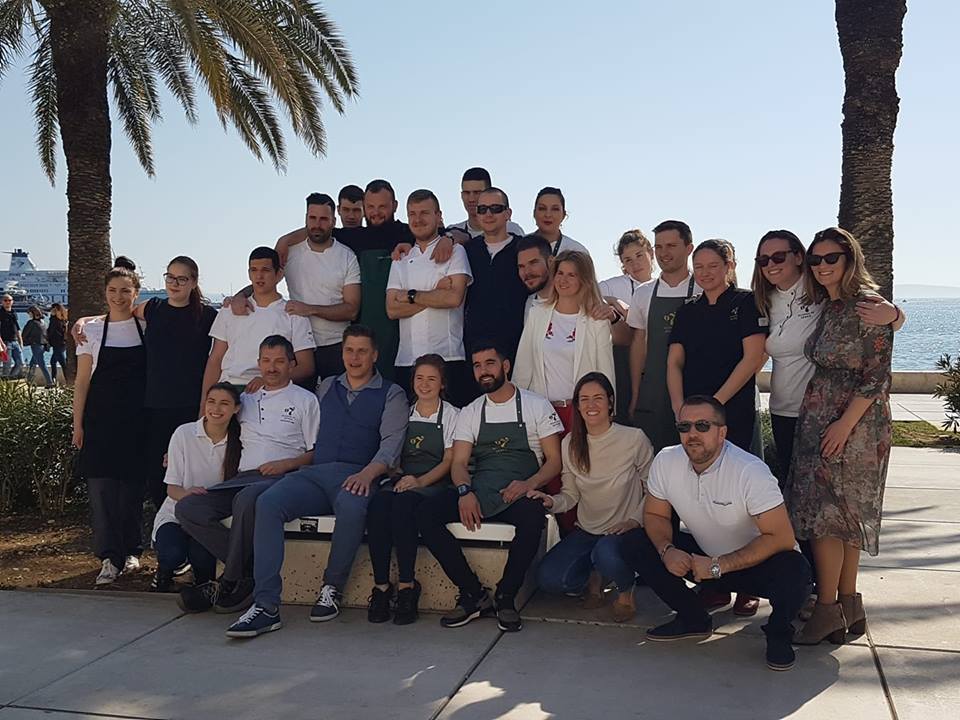
Many diaspora think of returning but few do. In truth, there is little information out there about real-life stories and help/info about the process. What advice do you have for those who are thinking about making the move?
The biggest advice that I can give is: to forget what you know. Don’t compare the systems here to the systems that you are used to back home because if you do you will find it almost impossible to accept the way things are here. If you are constantly comparing things you are very likely to become angry, negative and bitter. I think a lot of people end up really frustrated with the system here and then out of frustration, give up. Try to look at the bigger picture: all the bureaucracy is temporary if you can manage to break through the very thick ancient stone wall, it is well worth it. It's kind of like giving birth eventually you forget all the pain :) How were you perceived in Split as foreigners/diaspora moving back - was the welcome warm?
I think the locals that we met were a little intrigued when we first got here and opened the business. There were definitely not many diaspora teenage girls opening up businesses back then! They always noticed that we worked hard and always respected us for that.
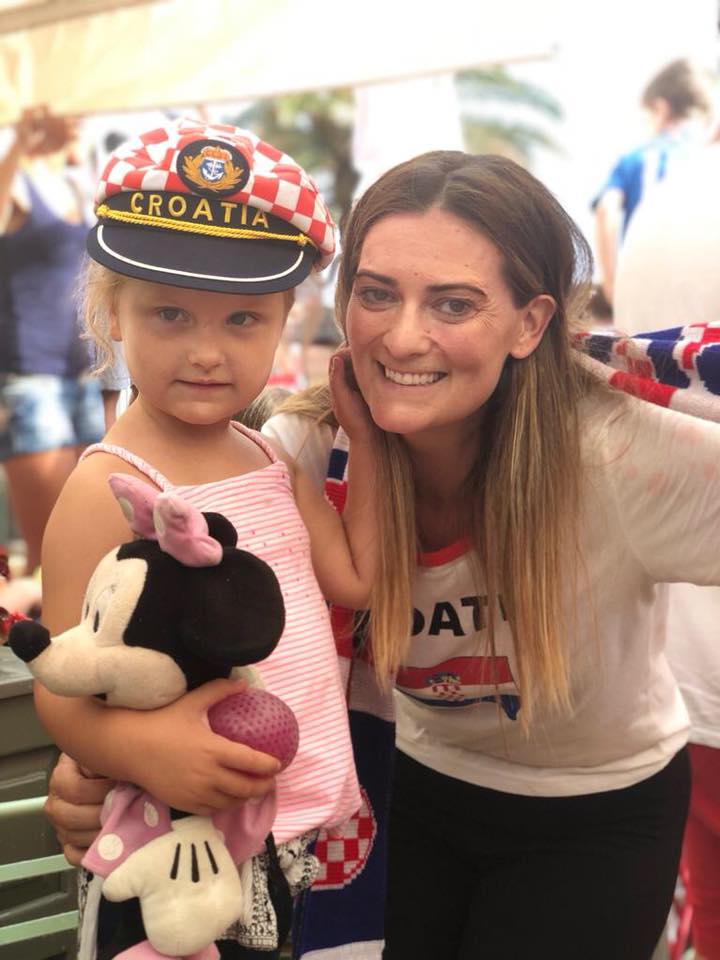
Through a lot of hard work, you two young ladies have been very successful, while many foreigners have given up and left Croatia. What are the keys to success in doing business in Croatia in your opinion?
Having a plan is very important and finding a niche in the market is key. There are still so many things that are needed here and I believe would be successful if done right. Having a good team of people to work with is also crucial. This definitely takes a lot of time and effort like it does anywhere but once you have the right foundation then everything is much more achievable and enjoyable.
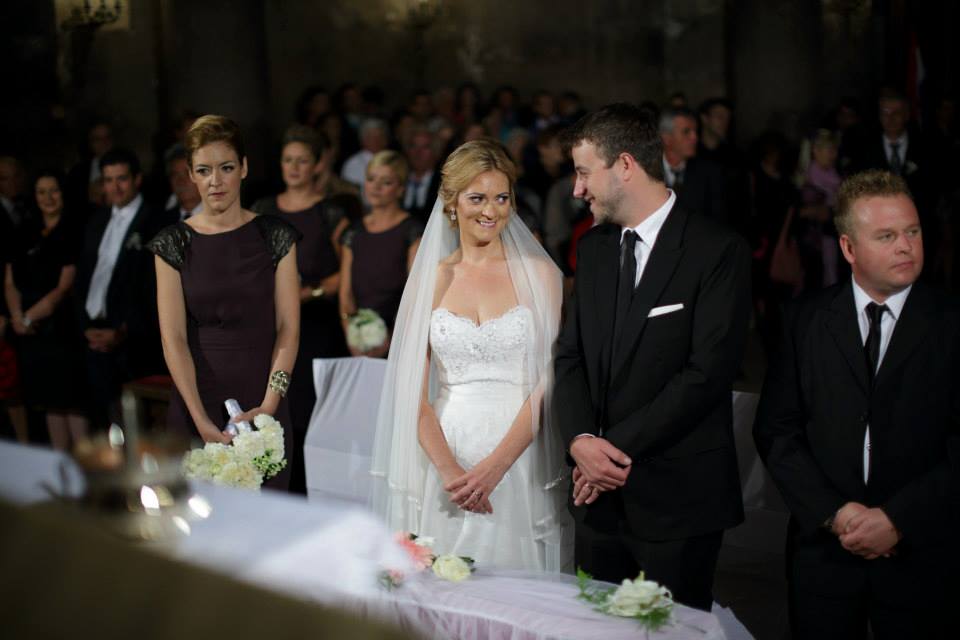
And finally, a word on this conference. What are you hoping to get out of it?
I am hoping to hear other people’s positive experiences and hear about future plans and projects in the region.
For the full programme at the 2nd International Conference on Diaspora Tourism (in English and Croatian), click here.
For more on the Croatian diaspora, check out the TCN dedicated section.
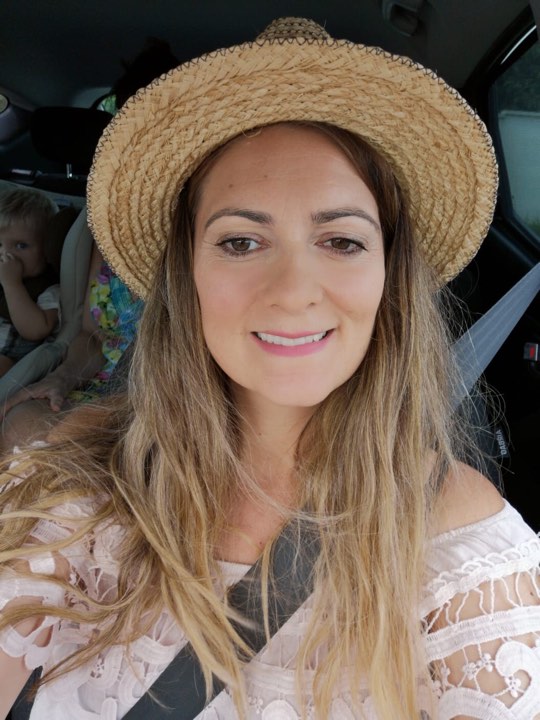
Successful Diaspora Returnee Stories: Eugene Brcic Jones, Venatus Jones, Zagreb
The 2nd International Conference on Diaspora Tourism opens in Split on May 17, 2019. In the build-up to the conference, TCN meets some of the returning diaspora who have made a success of life in Croatia. Next up, Eugene Brcic Jones.
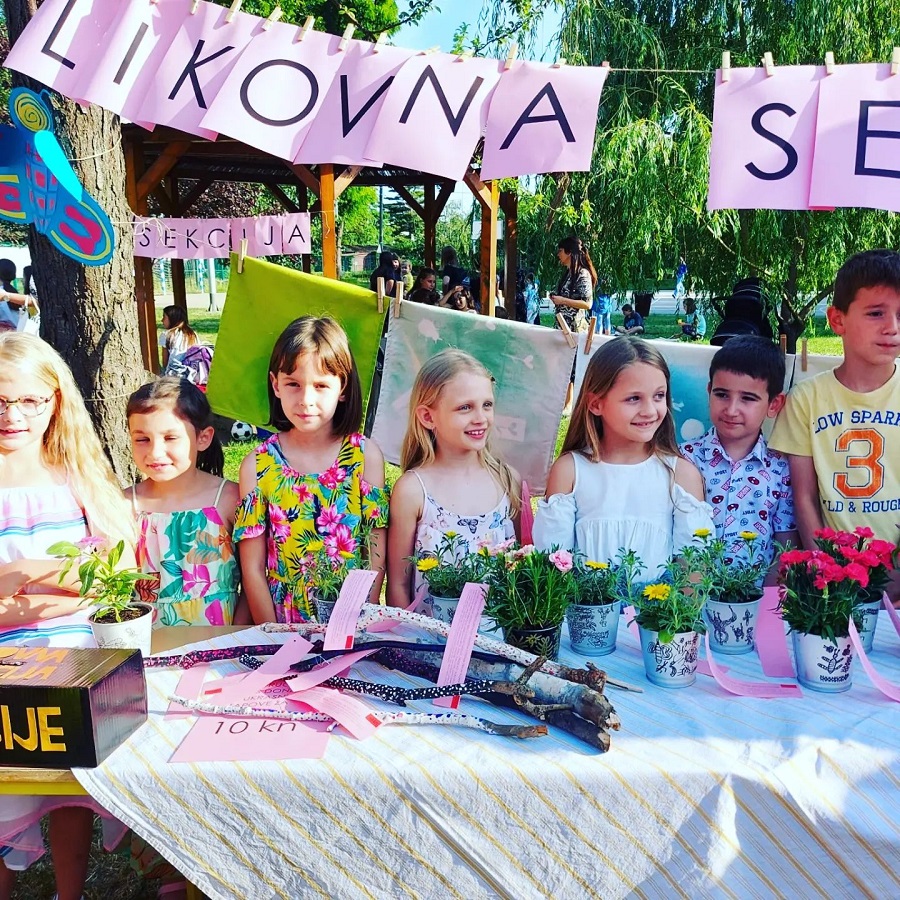
With so many young people emigrating from Croatia due to lack of opportunity, there are a number of the Croatian diaspora looking to move in the opposite direction and return to the Homeland. Few actually make the move, for a variety of reasons: the uncertainty of what awaits, lack of much available information of the realities of the process and experiences, and a reluctance to move from successful Western economies to the struggling Croatian economy. Meet one man who has been a returnee not once but twice.
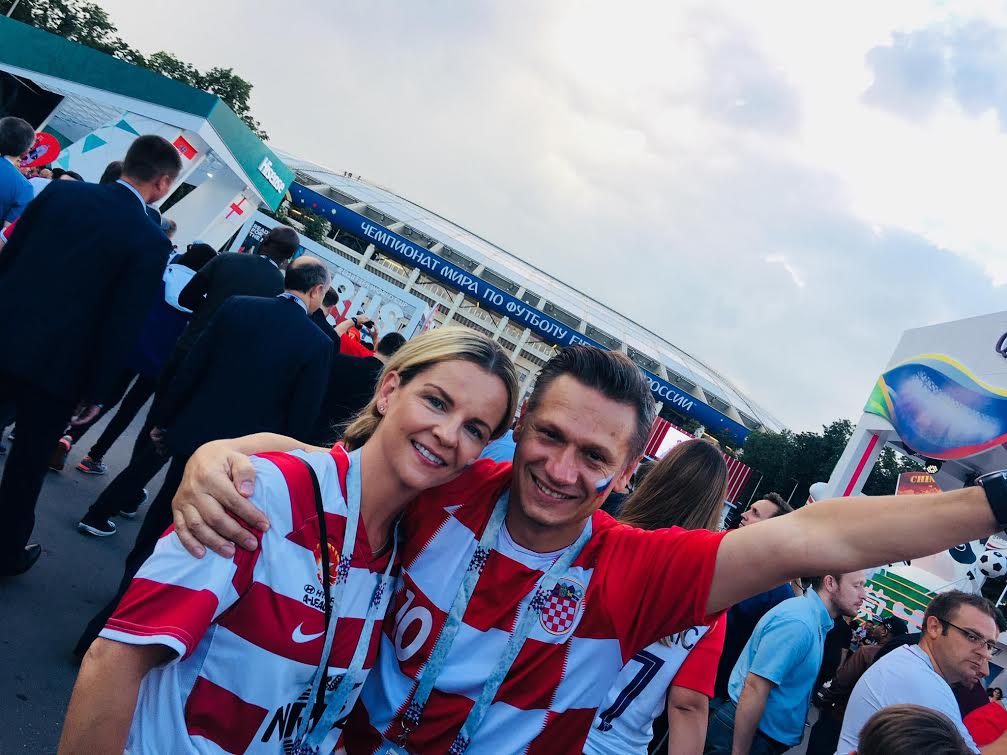
1. Born in Australia, returned to Croatia, something that many diaspora dream of doing. Tell us briefly about your journey.
Hi, my name is Eugene and I’m a Croatia addict.
I’ve been calling myself a ‘serial returnee,’ as it’s not the first time I’m back here. I’m a second generation Croatian who previously returned in 1991, amid the worst bloodshed in Europe since WWII.
I returned to Croatia again two years ago, after a 7-year stay in Sydney, with my Aussie wife Michelle and two girls, Eden 5 and Emerson 4.
It’s probably understandable for a young, single guy to enjoy living in Croatia but it’s more like a disturbing medical condition for a family to make the move while droves of others are heading the other way, so I can understand the curiosity.
The idea of moving to Croatia evolved after a 3-month family holiday four years ago. I hooked Michelle and the kids onto my addiction after taking them from the tip of the Adriatic to the bottom, from Rovinj to Dubrovnik, with long stays in Zadar and particularly Zagreb, where I lived and forged amazing memories and friendships.
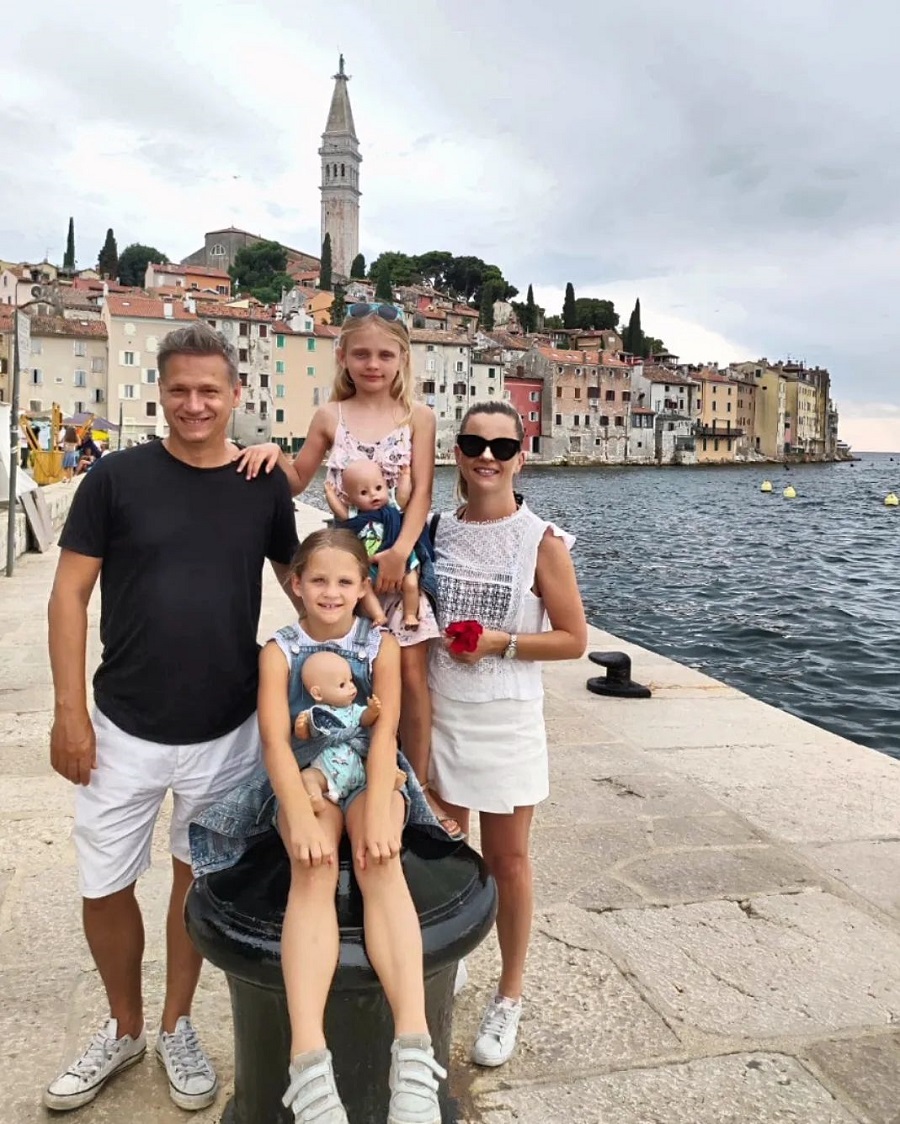
Australia was becoming a bore, a tiresome rat-race and we wanted to break from the mold, do something different, a lasting adventure. The work-life balance myth in Sydney wasn’t working for us and we didn’t want to spend our lives as mortgage slaves. We toyed with equatorial countries that would allow us to live off a passive income from renting our home, places like Panama, Costa Rica or southern Italy and Spain tantalized our fancies. The kids would become bilingual, maybe home-schooled, it was all just the stuff of dreams at first. Then Michelle suggested Croatia, and before she could take it back I booked our tickets and packed our bags.
OK, maybe there was more thinking, and Excel spreadsheets, but why let the truth get in the way of a good story?
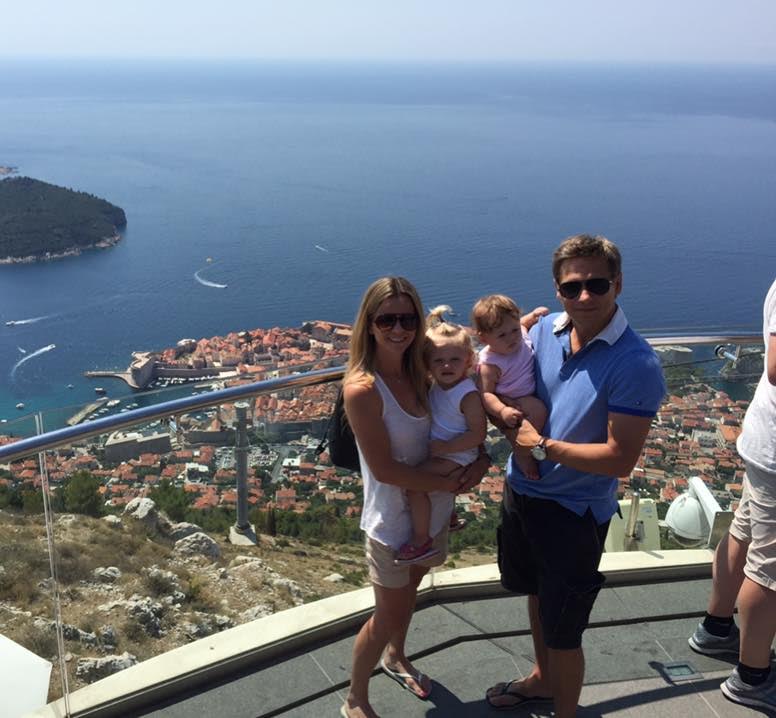
2. Looking back, what were your hopes, expectations, and fears about moving to Croatia?
My greatest fear was that I’d bankrupt the family and my wife and kids would stick their middle finger up at me at President Franjo Tudjman airport and abandon me. Two years later, I still have this fear, but I use it to motivate me.
For some stupid reason I expected that everything I touched would turn to gold, but things sort of went pear-shaped in the first year. I couldn’t get the sort of work I wanted to ensure a cosy life, so there was a lot of anxiety.
In the end, I decided to start my own business, a consultancy for small to medium-sized enterprises (SMEs), and things gradually started to turn. Basically, I started treating Croatia like it was Australia, a country with no free lunches and I buckled down and worked my nuts off to find projects and clients.
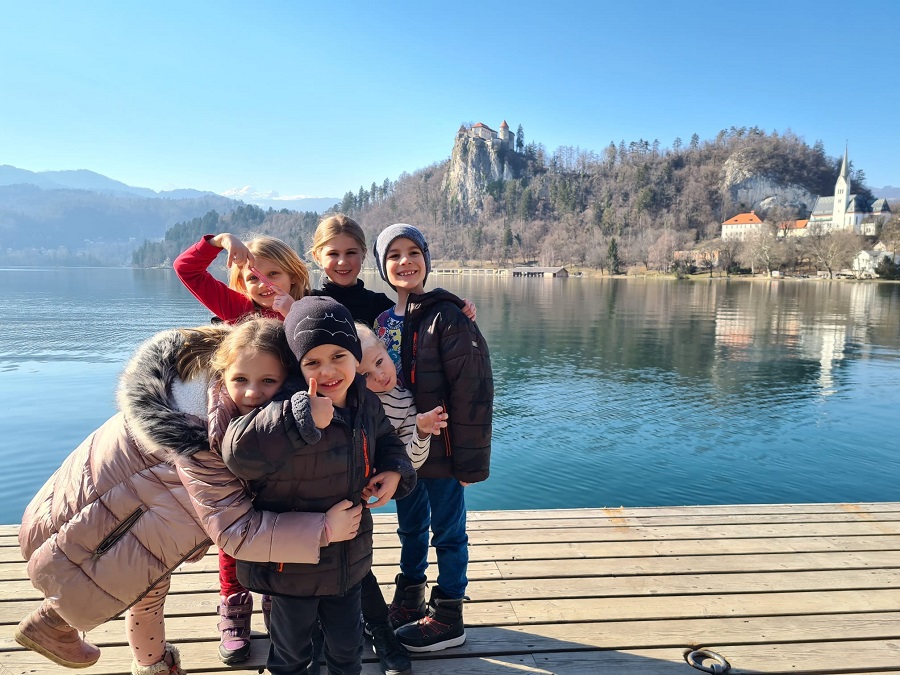
3. How supportive was your Croatian community back home at the time?
They were very supportive – šatro! My friends and cousins back in Australia were making bets how quickly I’d fall flat on my face and the whole bankrupt and abandoned scenario was odds on favourite in less than 6 months. No one expected a lucky streak this long, so there’s a lot of bitter gamblers out there sitting on the sidelines of life.
Decisions like returning to Croatia are really high stakes, you really have to know your limits and hedge your bets. I don't think you should bank on support for a radical choice like moving to Croatia, your loved ones will tell you to get your head checked.
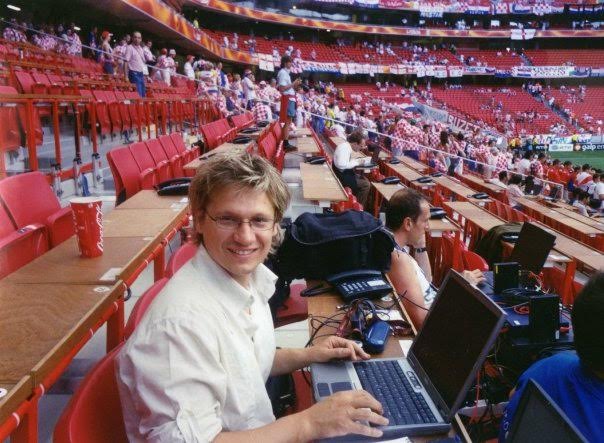
4. What were the main differences in what you expected to find in Croatia and the reality of living in Croatia?
The main difference in Croatia is that you buy back a lot of time, which is essentially the most precious thing we have. Time with the people you love, the things you love doing. For me, it’s family and friends.
In Australia, we sacrifice a lot of time to make a living, commuting to work, working some drudgery for a wage, and then maintaining the wealth by shrewd investments - often working on top of work again, like gardening, extending your home or making renovations. It’s all about constantly creating value, amassing wealth, preserving status. The competition and accompanying stress is relentless.
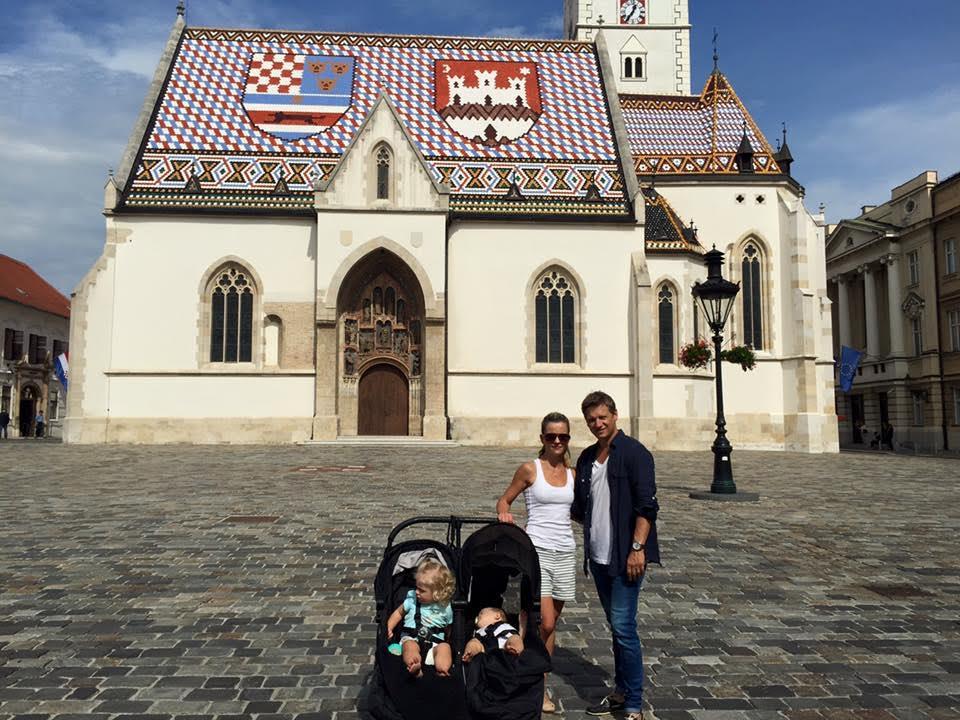
5. Many diaspora think of returning, but few do. In truth, there is little information out there about real-life stories and help/info about the process. What advice do you have for those who are thinking about making the move?
I’m not sure it’s possible to make a fully informed decision. It’s always going to be an emotional, gut or knee-jerk response regarding a place like Croatia. Lots of people have tried, given it their best shot and few have made it, so you can forgive people for not even entertaining the risk.
If you were moving from Australia to the US or Switzerland you would use common sense, crunch some numbers and probably be able to anticipate or rely on many things, like work opportunities, government and institutions, especially the legal system. But Croatia is a different kettle of fish. It really is like an addiction, an irrational attraction that pulls you like a magnet. You move to Croatia in spite of knowing the government and its bodies are useless and corrupt.
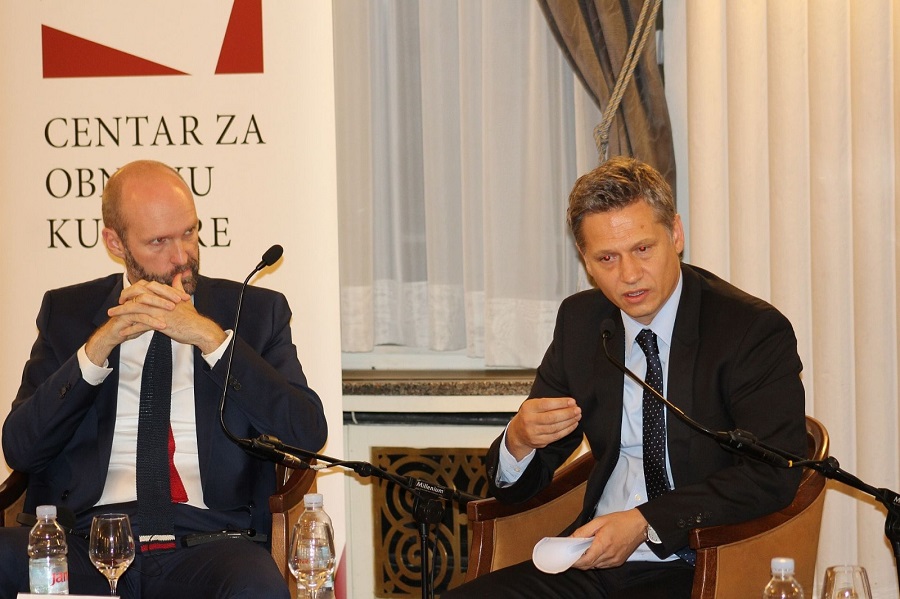
My advice would be to expect the worst and be positively surprised when the worst doesn't transpire. Plan your finances, go for a trial run, a year off, a sabbatical. Try house swaps, there's some really cool opportunities nowadays that will save you a bundle and allow you to experiment. You only live once, so trying a new landscape, new culture, language and lifestyle will provide permanent memories to relive, even if you pencil it down as a fail and return. It's all about unique experiences afterall, I think.
6. How were you perceived in Zagreb as foreigners/diaspora moving back - was the welcome warm?
There is a notion that diaspora are a bunch of nationalistic morons. To be fair, a lot of us from diaspora are a bunch of morons and our reputation is not as stellar as we imagine.
However, we have a lot of ingrained experience with genuine democracy and free-market economies and that is valuable currency in Croatia. Smart people will respect you and be welcoming. It will be easy to strike up friendships with people in the same trade or social status.
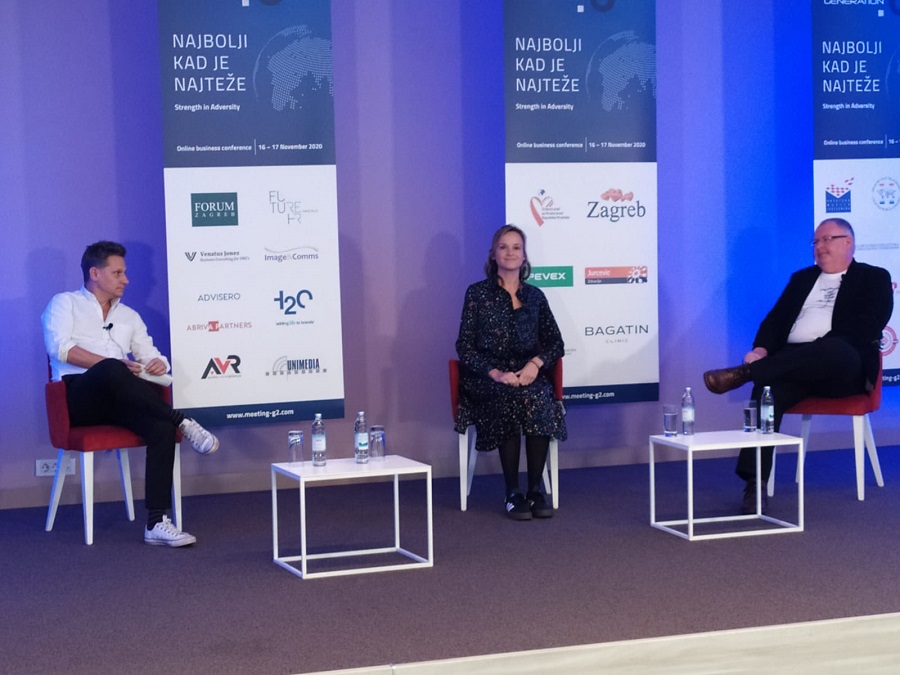
Good people gravitate to each other, if you are a cool dude people will quickly notice this about you and you will establish a great circle of friends soon. We have so much to learn from each other. Being conceited about being from the West might work short-term but won't play well in the long run.
7. Through a lot of hard work, you have been very successful, while many foreigners have given up and left Croatia. What are the keys to success in doing business in Croatia in your opinion?
Like anywhere in the world, the main formula for success is hard work. We are lucky that we grew up in market economies and understand how rags-to-riches stories evolved. Our parents are likely examples, so it’s obvious to us that there is no substitution for hard work. Talent or skill and luck all play a part, but hard work is the glue that holds it all together. Optimism is also key. It’s a strong motivator and inspires self-fulfilling prophesies.
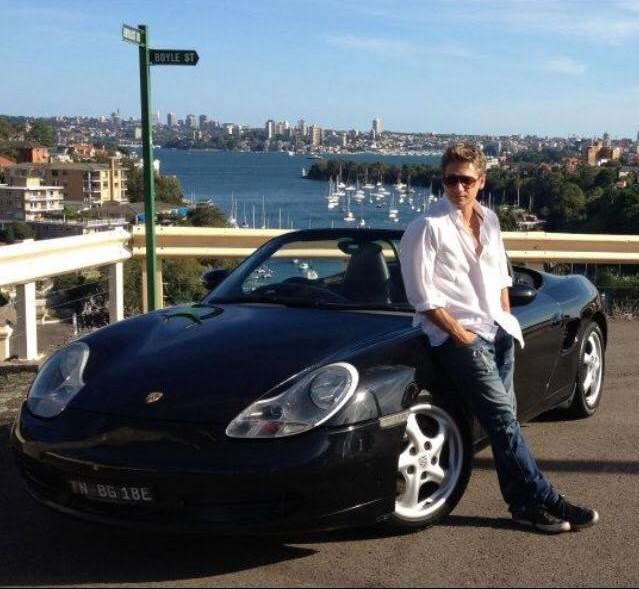
It is tragic that so many people have been burnt, my family included. More or less everybody I know from abroad has been taken for a ride. I see now that we are not without blame. We have been gullible and stupid. We misplaced our trust in a system that is still plagued by the legacy of Communism. This system is riddled with corruption and nepotism and despite reforms, it’s still in transition and hazardous.
It’s important to exercise extreme caution and avoid dealing with the government as much as possible. Fortunately, we have an edge over locals working in the private sector given our customer-focused approach to business.
There is also the EU market and various funds available that make it a fruitful period to be in Croatia from a business perspective.
It’s a global economy and working from Croatia gives you the best of both worlds if you have goods and services to sell. One of my clients is a start-up in the hotel industry, RoomOrders.com, and we have expanded to three continents, through leading hotel brands like Hilton and Sheraton. A previous client, Museum of Illusions, is in over 20 cities around the globe and is the world’s fastest-growing museum chain.
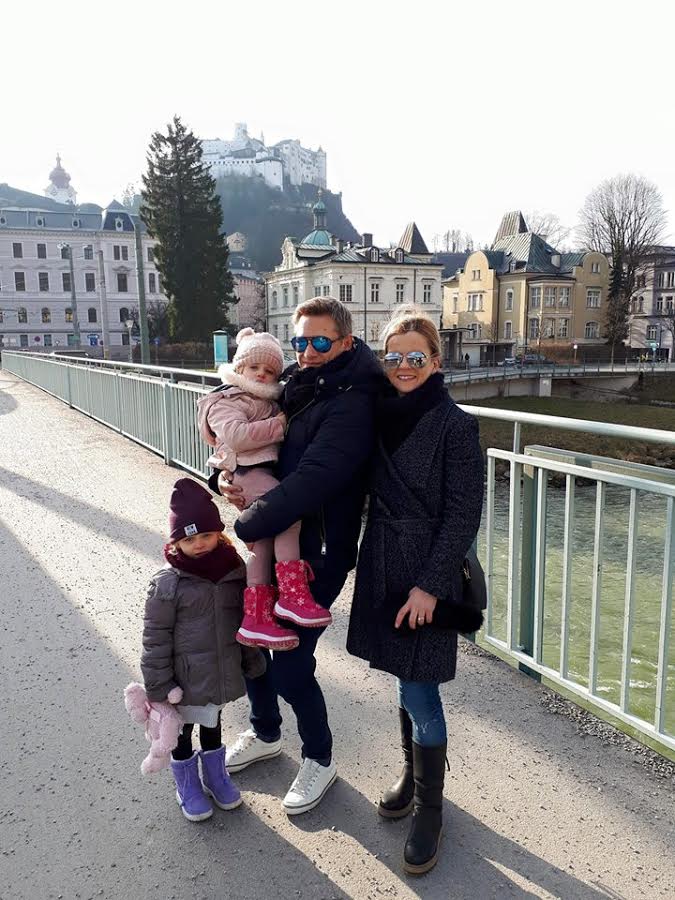
8. What is the diaspora community like in Zagreb and how integrated is it with locals?
Zagreb is an increasingly cosmopolitan city. It has a strong expat community and the diaspora is strong and integrated with both the local and expat community. There is a lot of variety, clubs and interest groups. The degree to which somebody wants to assimilate is completely individual, you can immerse yourself fully, or be a butterfly, we are spoilt for choice in Zagreb. I’m proud to be living in Zagreb when I see it bustling with non-traditional visitors from Korea, Japan, Americas, as well as the range of cuisine on offer, from curries, tapas, sushi to kebabs and fajitas.
9. And finally, a word on this conference. What are you hoping to get out of it?
The conference will feature some high fliers from diaspora, people who have put in the hard yards and proven that success is possible in Croatia. I’m looking forward to hearing their accounts, their trials and tribulations. It will be a great opportunity to compare scars and trade war stories. There are more and more conferences of this type, so I’m excited about meeting new friends, gaining new insight and generally learning more about Croatia’s business environment in diverse industries from people just like me.
You can connect with Eugene Brcic Jones via his business website Venatus Jones.
For the full programme at the 2nd International Conference on Diaspora Tourism (in English and Croatian), click here.
For more on the Croatian diaspora, check out the TCN dedicated section.
Stephen King's 'The Dark Tower' TV Series Filming in Split
Have you noticed a film set coming to life at the Golden Gate entrance to Diocletian's Palace in Split? Here's why.
New Tourist Offer in Split: Franciscan Monastery Transforming into Hotel
It’s no surprise that Split has become a real tourist mecca in recent years - and the number of beds in tourist accommodation has grown from season to season at a rapid pace. Perhaps, for this reason, it is not so surprising that even the most unsuspecting of groups have jumped on board the tourist train.
Namely, Dalmatinski Portal reports on May 10, 2019, that the Franciscan Monastery in the Split area of Trstenik has transformed into the Pax hotel, and is already receiving reservations via Booking.com. The opening of the new tourist haven is in less than two weeks, said the guardian of the Trstenik monastery, Domagoj Runje.
“One wing of the monastery remained empty after the Faculty of Philosophy left in 2017. We were looking for different solutions, and there were a lot of ideas, but making a hotel has proven to be the most realistic option. We aim to book guests who want peace and quiet. The hotel opens with partner Ivan Livaković from Kaštela. He owns a car wash and has a villa for rent. We gave him the space to rent out, but we do not have the necessary skills for tourism. We entered the project together, and together we financed the renovations,” Runje said.
The hotel Pax is located within the monastery in Trstenik and boasts 40 double rooms. According to the prices on Booking.com, at the beginning of June, a room can be booked for 815 kuna.
However, not everyone is thrilled that the church is moving into the hotel industry. Dalmatinski Portal revealed that they received a letter expressing concern with the Franciscan’s latest acquisition, suspecting that behind the decision to rent part of the monastery, there are the personal interests of certain groups. They also announced that they would address higher church institutions to investigate this 'shocking' decision.
Runje, however, saw nothing controversial in the new business venture.
“I do not know why these people did not come to me; I would explain everything to them. There is nothing controversial in the business, the partner is a verified person with references, and I really do not see what the problem is,” Runje added.
Runje was also asked if it is customary for the church to turn its rooms into hotels.
“Of course, nothing is strange here. You have examples of this. The monastery in Bol has its own catering facility,” Runje concluded.
To read more about travel in Croatia, follow TCN’s dedicated page.
Successful Diaspora Returnee Stories: Maria Mustapic, Brasserie on 7, Split
The 2nd International Conference on Diaspora Tourism opens in Split on May 17, 2019. In the build-up to the conference, TCN meets some of the returning diaspora who have made a success of life in Croatia. We start with one of our favourite stories, Maria Mustapic in Split.
With so many young people emigrating from Croatia due to lack of opportunity, there are a number of the Croatian diaspora looking to move in the opposite direction and return to the Homeland. Few actually make the move, for a variety of reasons: the uncertainty of what awaits, lack of much available information of the realities of the process and experiences, and a reluctance to move from successful Western economies to the struggling Croatian economy.
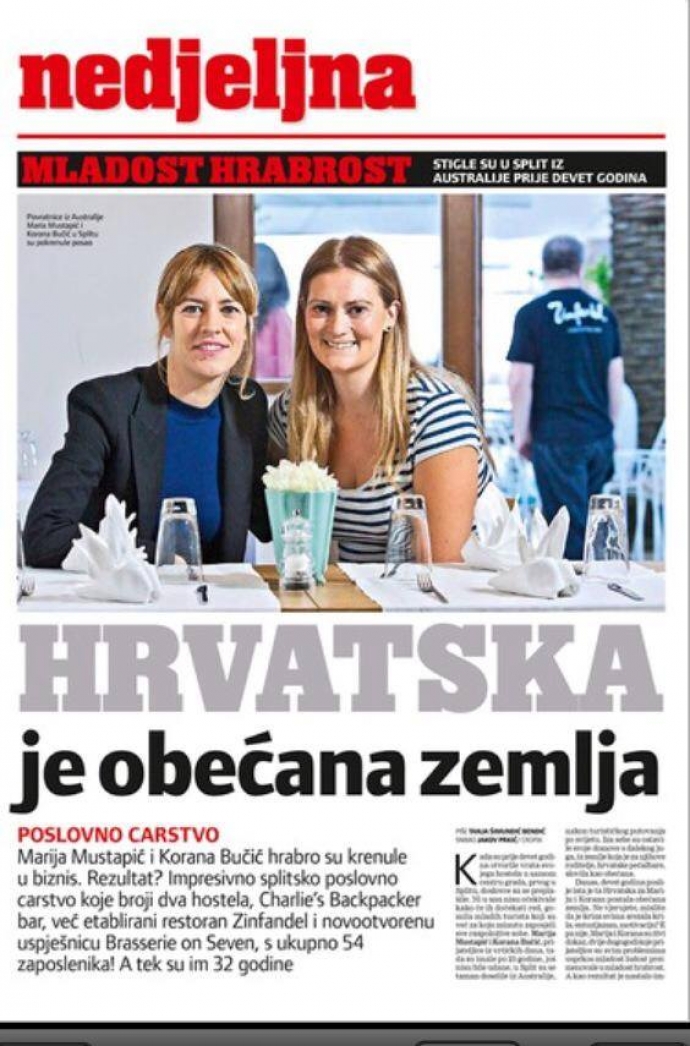
But there are many who have made the leap, some with considerable success. One of the themes of next week's 2nd International Conference of Diaspora Tourism in Split will be a focus on those success stories. By sharing experiences and bringing concrete examples of success, the conference will showcase what is possible, hopefully inspiring others to try their luck.
Croatia desperately needs to engage with its diaspora, and there are signs that this is happening. A new generation of Croatian entrepreneur and business-minded diaspora network are connecting as never before, forging links directly, with minimal contact with the State.
In order to support these positive waves, TCN will be conducting a few interviews over the next couple of weeks with speakers at the conference, hearing their stories and experiences, lessons learned and advice for those who are thinking of returning.
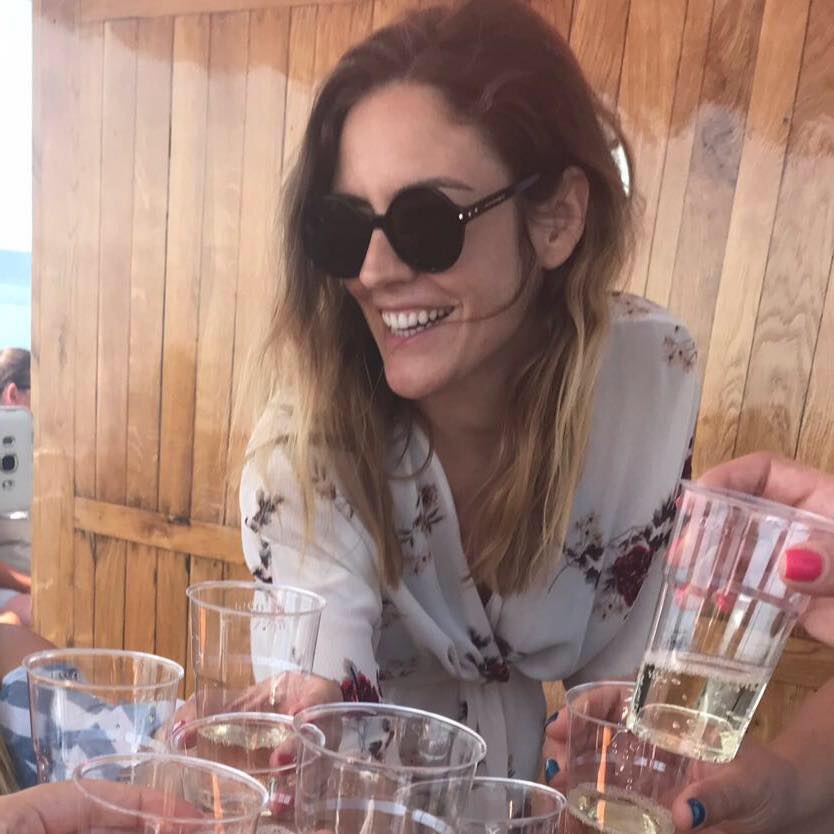
We begin with one half of perhaps my favourite success story of all. Maria Mastupic and her childhood friend, Korana Bucic, moved from Sydney to Split about the same time as I did back in 2004. Although it was years before we met, their reputation preceded them, and they quickly became the legendary Australian girls who opened a hostel in Split, and then just kept on going. They did a GREAT interview with TCN a few years ago on their journey - well worth a read - and Maria was kind enough to agree to an interview ahead of her speaking at next week's conference (full programme details here).
1. Born in Australia, returned to Croatia, something that many diaspora dream of doing. Tell us briefly about your journey.
The journey has been a rollercoaster, so much growth, a huge learning curve, and a lot of patience and perseverance. In 2004 we did a Euro trip with a group of friends and realised the lack of hostel accommodation so thought, this something we could do. We went back to Australia, did our research, a business plan and figured out a way to make it happen. We arrived in 2006. Once we were established we realised the opportunity for so many more business ventures and one thing led to the next. In 2008 we opened a little health orientated fast food called ‘Fab Food’, but that was way ahead of its time. So we closed that after 2 years and in 2010 opened the second hostel along with a backpacker bar ‘Charlie’s’. By 2013, having lived in Split now for 7years we were fed up with ‘lack of dining scene’ and repetitious menus and decided to try our luck in the gastronomy business. That resulted in the creation of Zinfandel food and wine bar and Brasserie on 7 in 2014. Overall, the journey has been great and thankfully well worth it.
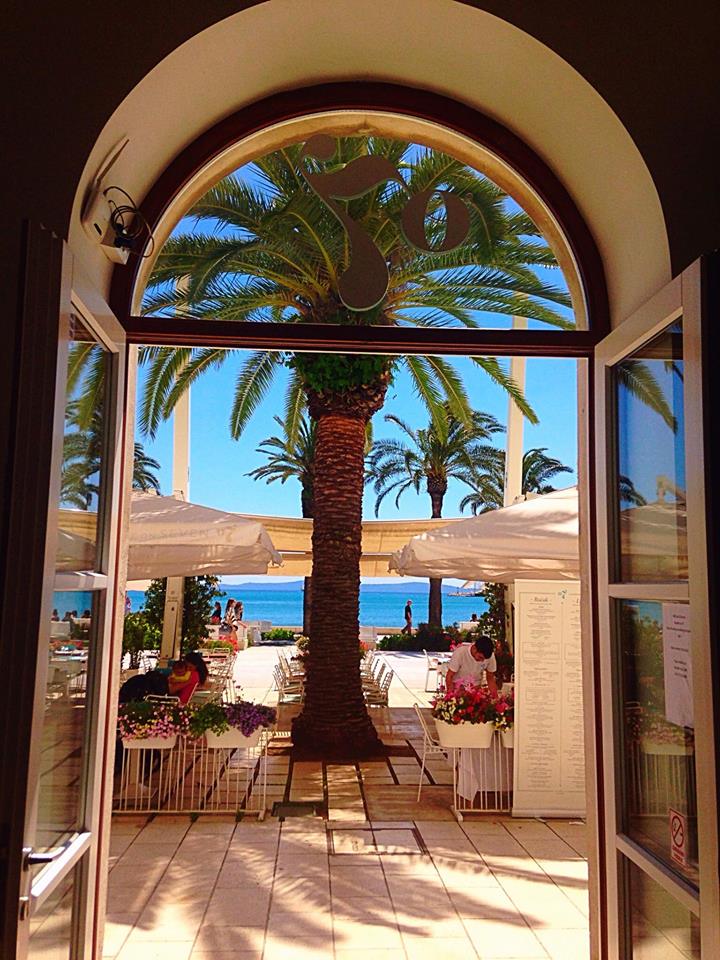
(Brasserie on 7, the best dining address on the Split Riva)
2. Looking back, what were your hopes, expectations and fears about moving to Croatia?
The upside was we were 22 when we moved to Split, but nevertheless, we had a plan and were determined to achieve it. However we didn't have much expectation, nor did we have ANY idea of what we were getting ourselves into. At 22 it was about seizing the day. Worst case scenario we move back to Sydney, split the debt and pay it back. We kept things simple, relied on each other and didn't give up. We were young and weren't so fussed or stressed about the bigger picture or financial gain in the beginning. It was an adventure. The fears were, leaving our comfort zone, having no friends, not being familiar with barely anything, the language barrier and I guess failing certainly would have been a fear as well.
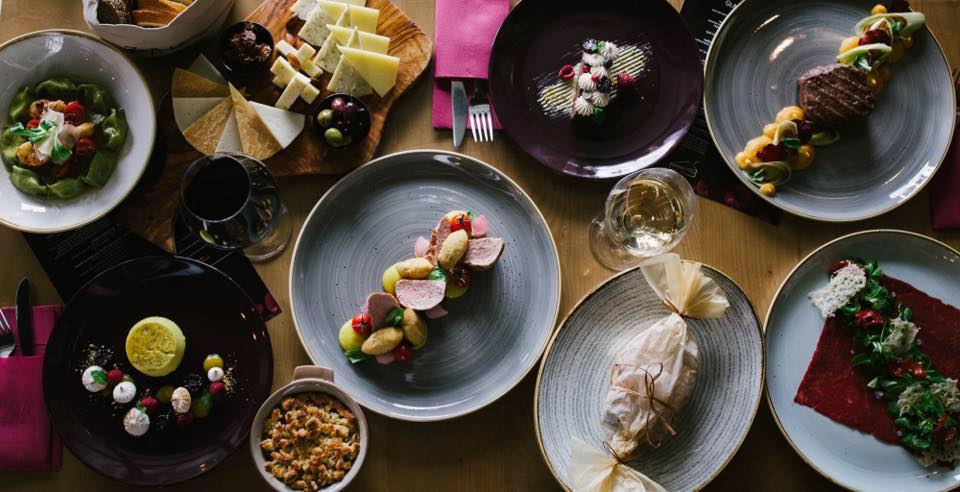
3. How supportive was your Croatian community back home at the time?
We didn't tell a lot of people, we didn't know if it was going to be permanent, or what would come of it. Our immediate family and friends obviously knew, they were extremely supportive, very surprised and thought it was gutsy, but supported us 100%! A few people made comments that we would be back before we knew it but I don't think anyone took it too seriously in the beginning.

(Zinfandel Food and Wine Bar was ground-breaking for Split when it opened in early 2013)
4. What were the main differences in what you expected to find in Croatia and the reality of living in Croatia?
The main differences were, the high’s and lows of seasonal changes, the lack of empathy, openness and assistance from the government sector. And the installment of fear that the locals were paralysed by. The pessimism and negativity is part of the culture, I can also now more so understand why. But thankfully as I mentioned being 22, the expectation was limited. For us, it was riding out the European summer dream and turning it into our lives and the hostel was the perfect way to achieve that. We were semi-aware of the stagnation of the country and the economic situation. But on a micro scale, for us, business was booming and were having a lot of fun doing it.
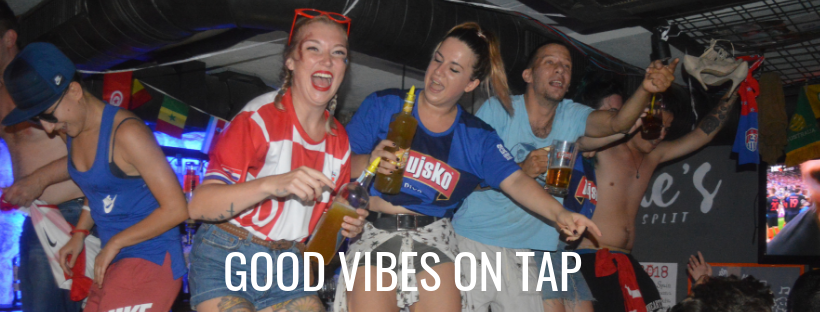
(Charlie's Bar has become an institution in Diocletian's Palace)
4. Many diaspora think of returning but few do. In truth, there is little information out there about real-life stories and help/info about the process. What advice do you have for those who are thinking about making the move?
Be prepared with daily frustrations, solitude, things you take for granted, its a great lifestyle for pensioners and young families who want a slower pace, as long as the family can financially survive. Personally, I think you need to have a plan, as many doors won't open up to you just like that. If you are moving to Zagreb then I'm assuming you can find a professional job with decent pay and create a stable new life. And maybe even change jobs once in a while. But in Dalmatia, the professional workforce is very limited. You also need to be patient, it took me a very long time to understand how everything works here. Persistence and perseverance.
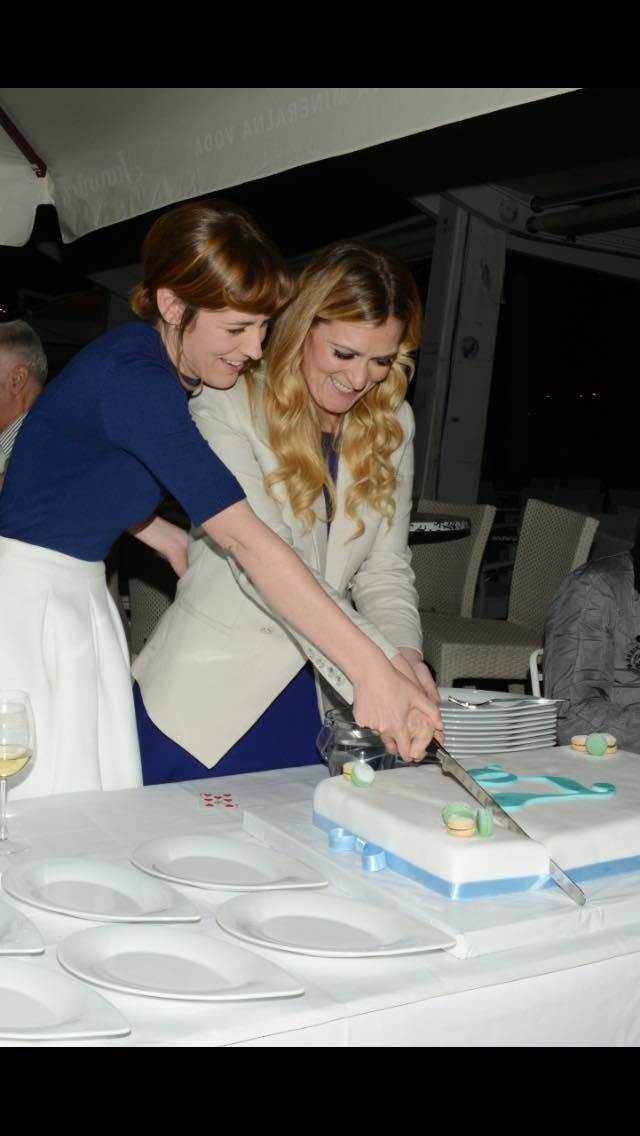
(The opening night of Brasserie on 7 in 2014)
5. How were you perceived in Split as foreigners/diaspora moving back - was the welcome warm?
Everyone was confused as to why we came and didn't understand our business model. Most government officials and offices were a nightmare to deal with, but the locals were quite warming and helpful. I think they were Genuinely concerned for us, especially as we were without our immediate family and feared our failure.
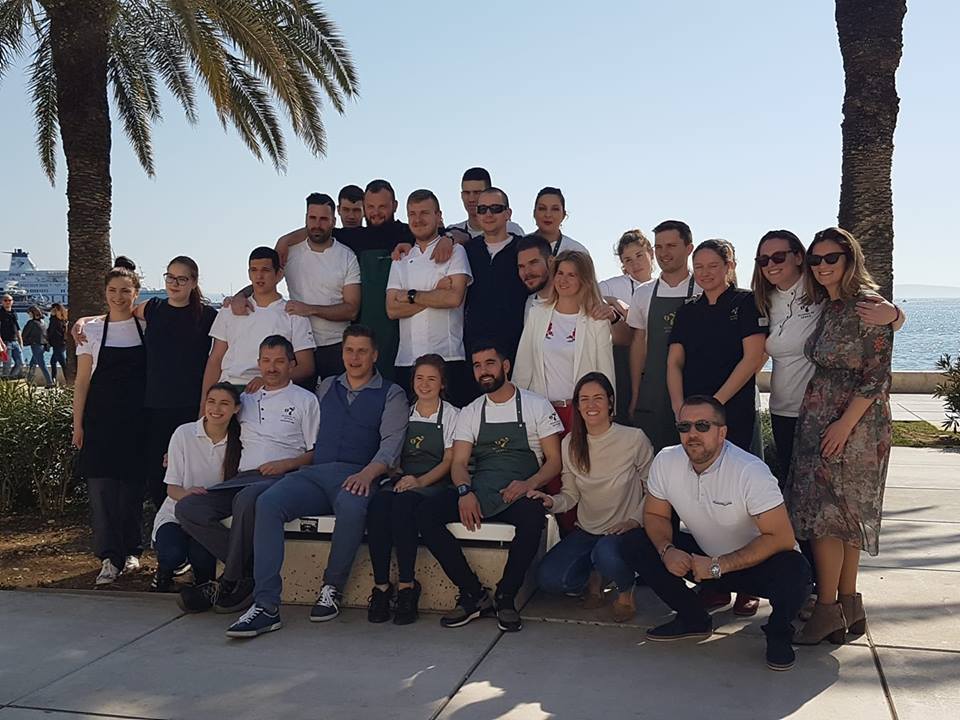
(The B7 team celebrate 5 years in 2019)
6. Through a lot of hard work, you two young ladies have been very successful, while many foreigners have given up and left Croatia. What are the keys to success in doing business in Croatia in your opinion?
Unfortunately, I believe the Golden rule is that your business is relying on and selling to a foreign market! And it is about finding the right team. Finding people that believe in the project and the company.
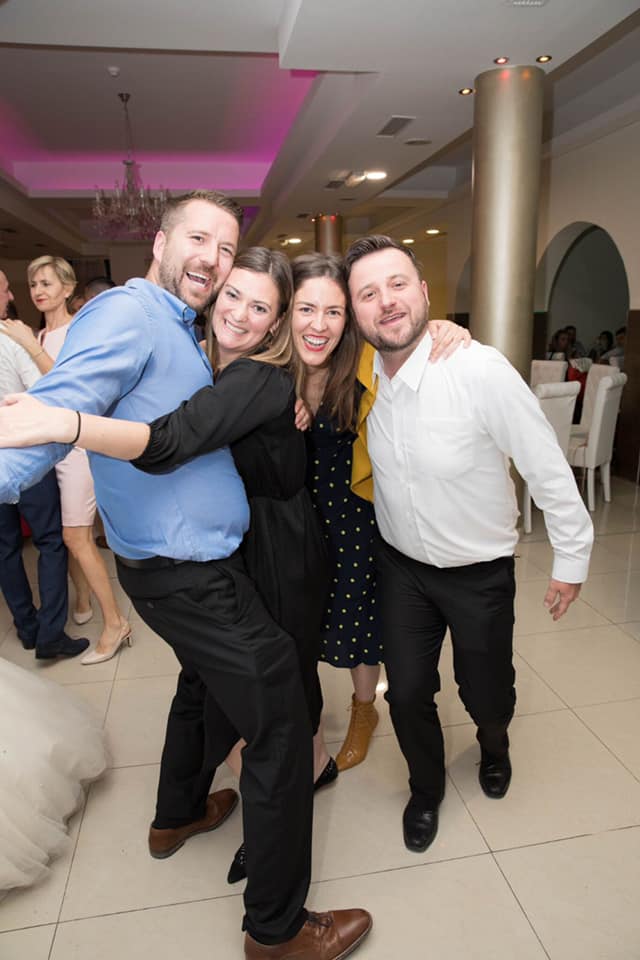
(They even managed to pick up a couple of Croatian husbands along the way)
7. What is the diaspora community like in Split and how integrated is it with locals?
It is basically a large expat community and then within that group are those with Croatian roots. But there is no diaspora group per se, as far as I am aware. We ourselves are extremely integrated with locals as they make up 99% of our company, and from what I can see there are strong ties to the community amongst others as well.
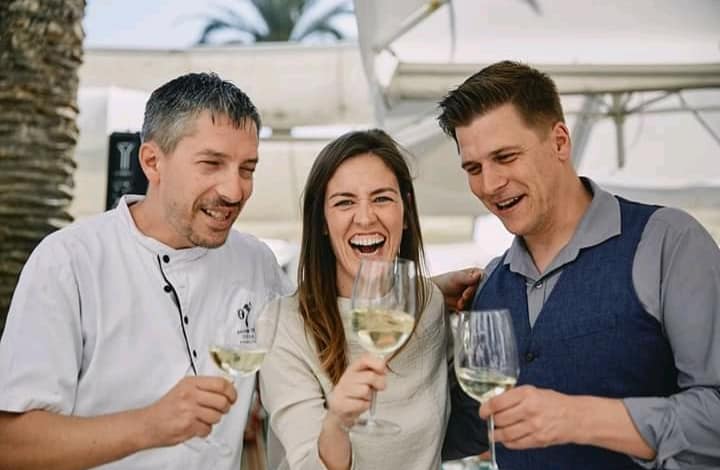
(Maria with some of the stars of the B7 team)
8. And finally, a word on this conference. What are you hoping to get out of it?
Firstly, I and Korana are relatively new mums, so our social calendar is almost obsolete. We are looking forward to meeting some new faces and maybe hopefully getting insight into different perspectives from others.
Visit the B7 website to learn more about this great dining experience, which started 15 years ago with a couple of Aussie backpackers wondering if they could make it in Croatia.
For more details on the conference, here is the full programme in English and Croatian.
2nd Croatian Diaspora Tourism Conference: Full Programme in English/Croatian
May 9, 2019 - The 2nd International Conference on Diaspora Tourism takes place in Split next week, from May 17-19. The full programme is below, in English and Croatian.








Prince Edward, Earl of Wessex, Coming to Split!
Prince Edward, Earl of Wessex, will visit Split on May 16 and 17, 2019, reports Dalmatinski Portal on May 9, 2019.
Prince Edward’s host will be Split mayor Andro Krstulović Opara, with whom he will visit Diocletian's Palace. The Palace symbolizes both the early and close link between Britain and Croatia - in the 18th century, Scottish architect Robert Adam was so thrilled by its architecture, he used it as inspiration for building designs in Britain.
On the British Royal Navy destroyer HMS Duncan, which will be docked at the Split port, the Royal Highness will be joined by representatives of the Government of the Republic of Croatia and the Armed Forces to mark close cooperation between the United Kingdom and the Republic of Croatia in the areas of defense and security - both bilaterally and within NATO - as well as the 10th anniversary of Croatia's membership in NATO.
Prince Edward will visit the First Gymnasium, which has been working with Aston College in Dover for 25 years. He will also open the British company ICE Marine Design, which specializes in ship design and has plans to employ 60 people in Croatia over the next two years, and will even meet with Professor Miroslav Radman, whose scientific research with the University of Cambridge, UK, will help us live healthier and longer.
“Members of the Royal Family are considered to be 'ambassadors' of the United Kingdom and the Queen. Their visits show the respect and attention of the UK towards the country they are visiting. The visit of Prince Edward emphasizes the permanent friendship and partnership of Great Britain and Croatia. Our two countries are already connected on so many levels, through history and today, in culture and science, defense and security, values and business. Nothing is more natural than building on this great base in the future,” said British ambassador to Croatia, Andrew Dalgleish.
This visit to Split will be the first official visit of Prince Edward to Croatia. His brother, Prince of Wales, was in Croatia several times, and his sister, Princess Anna, visited Croatia in 2009. Her Majesty Queen Elizabeth II visited Croatia in 1972.
To read more about travel in Croatia, follow TCN’s dedicated page.
The Villa Week in Croatia: "A James Bond Lifestyle Holiday Without the Stress"
May 9, 2019 - Looking for a luxury holiday in Croatia where all is included so you can literally #LeaveYourWalletAtHome? Meet the unique and innovative The Villa Week.
What is there was the complete holiday package for you and your friends to experience the ultimate in Croatia, where every single detail had been thought out and arranged in advance? So well in fact that all you had to do was show up and enjoy. So all-inclusive that you could safely leave your wallet at home.
Croatia has so much potential as a luxury tourism destination, but the supply of quality options is far behind the demand. But meet one man, whose innovative new concept on the Dalmatian coast, is providing an outstanding luxury tourism holiday which truly encompasses the very best that this diverse region has to off. Meet Grgo Gunjaca, CEO of The Villa Week, a new concept in luxury hospitality, which is certain to soon move beyond Croatia's borders.
A holiday experience which one guest summed up as "a James Bond lifestyle holiday, but without the stress."
But before you read our interview with Grgo, I encourage you to check out The Villa Week promo video to put you in the mood:
1. The Villa Week is a very cool new concept for luxury travel. How did it come about?
Obviously, a completely new luxury travel concept based on our motto “Expect Everything, Miss Nothing” couldn’t just pop up out of thin air. I have been working in tourism for 17 as a young med student - running, adapting, renting apartments in our family house. As we provided more and more services beyond the classic villa rentals, such as activities and excursions, I found that although we had a foundation of properties and a network of trusted partners, it was tough to convince people to book holiday upgrades and extras with us as they preferred to trust agencies.
So it became obvious something completely independent from the villas was required to enable such a project to be conceivable in order to catch the entire holiday value under one roof to be able to offer it on the market. Another important consideration in the concept were groups from The Yacht Week who would book villas to get a proper relaxing holiday typically after
The Yacht Week. Clearly exhausted from the previous week, they would always emphasize that they just couldn’t keep up parting with the youngsters and missed real beds and showers to actually get some rest as well as actually get to know the country they’re in. Nevertheless, my personal invitation to a wedding in January 2017 from a former guest of mine Sonia Ramdoo triggered the whole story, as the bride planned out a full packed itinerary in Trinidad (Indian weddings last for several days) with trips and activities and parties at night for her guests who were of all age groups from all over the world.
It was noticeble early on that the 30 year-olds somehow naturally gravitated to each other way more and got along exceptionally well. Now why was that? I would say perhaps this age group is more receptive to meeting their own kind and attend all kind of events unlike, younger that were interested only in partying, whilst the older were not so much up for adventure activities or parties.So I thought, wouldn’t it be great to recreate this again just for this 30-something group who are still young in spirit but seek and require comfort and quality?
And what better way to provide it all than to organize it with accommodation in villas. It should be noted that during recent years typical holiday agency trips focus more and more on specialized narrower groups of people that gather around one certain interests like yoga or party, which are obviously easier to organize than something that includes a lot of diverse activities.
The idea to do something that would include everything instead of just a yoga or fitness workout holiday. Why can’t we get to experience everything that can fit into a week with the flexibility to choose what we like and how much we want to do? Meaning sightseeing the best places, experiencing the greatest adventures, and partying at the best places accompanied with top quality accommodation as a key feature. Accompanying all that with quality cuisine at authentic dining experiences forming modern mainstream lifestyle nowadays are the essential last ingredient in the puzzle.
2. Take us through the concept in more detail.
I really had a hard time explaining the whole project into a sentence or two as less is often more, but in short it is an all-inclusive week in luxury villas boosted with more than 20 different events crafted into one ultimate holiday. Now even that sounds long right? However, once you reach a wider audience people that are not into it but get the whole picture can summarize it like no one from within. Therefore, the most descriptive comment we received on YouTube was “it's like a James Bond lifestyle holiday – just without the stress”. I don’t know if it’s the best description possible but don’t you just love it? Says pretty much everything.
3. You are starting in your home town of Podstrana near Split. Tell us what is on offer?
Apart from the fact that Split is getting more popular every year as an exceptional destination, the location itself offers much more being ideal to create a week of diversity. We want our guests by the end of the week to feel they like have visited multiple destinations on different continents. There are not many locations in the world that offer caves and casinos, islands and waterfalls, mountain canyons and rivers all within half an hour of your luxury beach villas. So we’ll definitely have a tough time finding new destinations once our customers inquire for them, but we already have something on the horizon starting with Montenegro.
4. Who is the target audience?
Our target audience is business oriented 25-45-year-old people that due to work don’t have time to organize a fully organized holiday in an interesting new destination. Offering a batch of new experiences to blow their minds and Instagram feed while all wrapped into a carefree holiday where they don't not need to pack and unpack every day in order to reach that new place and meet new people. However, all this is just a subjective starting point as it was easiest for us to create a project based on our personal needs and desires. Looking at the big picture TVW can literally be everything for everyone as we can just create different weeks for different groups of people like gay, parents with kids or pets.
5. What is included and what is not?
Once you think of villas, your first impression must be “oh this is great but how on earth will a gather a group of friends to fill up an entire villa”. Well the beauty of the project is that we offer both rooms and villas in shared or entirely private weeks so you can have your own friends in your villa not mixing with others or go the easier even more fun path to rent a room with a friend or partner or alone just like in a hotel or a cabin in a cruiser to share the experience with new people. And now to finally get to the question – everything is included meaning not just all food and drinks but tours and activities and even massages and 100 euro worth of chips in the casino. So instead of complicated explanations of what’s included, we just use just the hashtag #leaveyourwalletathome.
6. Your promo video is very enticing. Tell us about the making of that.
Well, one would think that a group of people having the fun of their lives just filming from the side would be enough to create some great content, but the reality couldn’t be further from it. Once the camera shows up even the most casual person freezes so the entire video usually comes down to a 2-3 persons typically female true talents that can relax in front of the camera in order to create this level of content. It’ll be interesting to see how it goes as we have just started implementing new ideas as dividing the video in different days of the week as different themes, really so much can be done as the project is so diverse.
7. What has been the feedback been so far?
Feedback has been great from the mouth to mouth advertisement because it is the only true channel that’s founded on trust, skipping a huge hurdle right there. On the other hand social networks and our website people are much more in disbelief as they tag Billy McFarland and the Fyre festival after seeing what we have to offer, and we can’t judge them as this is still way ahead of time – a one-click full-experience carefree holiday.
8. Tell us about the team involved.
Now that’s a colorful bunch of random young people and it just keeps on increasing. Apart from myself who am a GP with 17 years in tourism, our 3 villa hosts who take care of all our guests to 4 developers on working in completely different spheres from E-learning to VR and car rental managing systems, to our newest addition of a young entrepreneur in in Split focused on digital marketing and AI systems in that and our latest member IN our UK office that is doing the social marketing and consulting abroad, not to forget are our partners for photo video content as all the partners that provide the services used in the trips and activities themselves as part of the villa week itinerary.
9. Where do you expect The Villa Week to be in 5 years?
Unlike most of the projects that are based in Croatia the potential of The Villa Week is catchy as theoretically if there would be enough interest any villa in the world could run the program crafted for its destination. However, in the short term we are working on a new very simple addition in parallel called The Villa Weekend - quite a rational offshoot from The Villa Week, themed and suited for pre and post season especially attractive as a jump start for the week as its half the time, half the price so way easier to onboard.
Learn more about The Villa Week on the official website.
That video again...


